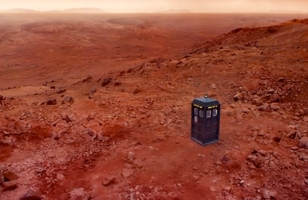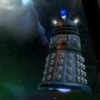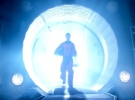The Waters of Mars

I love a good ‘The X of Y’ title. That said, they do tend to signify what one might charitably call “traditional” Doctor Who. Base under seige. Lots of running about. People getting picked off one by one. Fun, sometimes, but often a little boring. ‘The Waters of Mars’ is in fact just that sort of thing. And yet, pleasantly, not. It’s nice to see that in his last episodes of Who ever, Davies is back to taking some risks with the Doctor’s character, in a way not seen since the heady days of series one.
Our story opens with the Doctor landing on Mars, full of beans and ready for a new adventure. However, after only a little bit of exploring, he suddenly realised he’s landed smack bang in the middle of history; the first manned colony on Mars, one of those awkward events in time that must happen.1 And so quickly, the Doctor’s enthusiasm and wonder gives way to its disturbing and self-destructive flip-side; near-psychotic curiosity as he sticks around, forever wondering what’s going to happen next, and what on earth happened to Bowie Base One.2
The heroic and doomed humans are played well, but generally get little do do. Peter O’Brien’s Ed Gold continually verges on being interesting, but never quite gets there. The notable exception of course is Lindsay Duncan’s formidable Captain Adelaide, the ‘companion’ for the episode and one of the best characters in recent Who.3 The conversations between her and the Doctor start to peer into some of the peculiar elements of time travel that usually get swept under the rug, and provide one of the aspects of this story that elevate it above the dumb runaround it so easily could have been.
Also worth praising in ‘The Waters of Mars’ are the water creatures themselves. It may just be me, but these must surely be the best realised, scariest monsters that new Who has created. The cracked lips, the creepy eyes (well, on some of them). And what could be more terrifying than a slow dribble of water over your chin? It’s horrific when your drunk uncle Jim does it, and it’s horrific here too. It’s worth watching Doctor Who Confidential just to see how crummy they could have been, however.4
But the most intriguing and peculiar element of ‘Waters’ is the ending. Suddenly the story goes from being a nice but pointless base under seige story to something very special. Of course, then it sort of stops being special again next week, but I’ll get to that. Having spent the whole story telling himself he can’t interfere and has to leave, as the Doctor hears the brave humans scuttle about in abject futility, something snaps. Why does he need to follow the laws of time? Who, exactly, is defending them? HE’S in charge, dammit. HE’S the Lord of Time. All shall look upon him and despair. Nothing in the world can stop him now. It will be a deadly vengeance of deadly revenge.
It was at this point that I was tempted to reach into the TV and lend the Doctor a copy of ‘Father’s Day’, just to remind him exactly what does happen when time gets messed up these days, and how close he once came to being erased from existence. But let’s ignore that point as it’s easily handwaved.The really annoying stuff comes further on. There’s a few points of story logic which don’t fit in together as well as I’d like.
- The Doctor can convince Adelaide that she will need to die on Mars to guarantee her daughter’s future, and for that matter, the future of the human race. This is fine. He does this sort of thing all the time.
- If the Doctor goes loopy, Adelaide will believe what he told her first, and not his later post-revelation speeches. This is fine, too. If you tell someone you’re not going to eat a cookie, but then later start to rationalise to them why you definitely needed a cookie while you brush the crumbs from your t-shirt, then they’re unlikely to believe you. You’re just going to sound like you’re making excuses to bypass your principles.
- The future inspired by Adelaide and her team dying bravely on Mars is generally similar to the future inspired by Adelaide and two survivors inexplicably escaping to Earth, and in one case, committing suicide inside their apartment. This seems ropier. If I go to climb Everest and die on the way up, I’m a bloody hero. If I go to climb Everest, my team dies, and the next thing people find is my dead body back at home, I’m looking highly suspicious.
- Adelaide will be sure enough of point 3 to kill herself and make it come to pass. This seems shaky too. She’s a stubborn, single minded individual, of course. But she doesn’t seem the sort to operate on half-formed guesswork. And if she were, surely the obvious course of action for the Doctor after she shoots herself is to grab her body and drop it on Mars again, to make things look a bit more like history’s supposed to? If I were Adelaide, that’s what I’d have expected him to do. But no, apparently he needs to go have a cry instead. Doctors are so emo these days.
So, generally a bit odd, that. But still, exciting. The Doctor’s finally gone off the deep end and changed history! What horrible damage will this wreak on the universe? If you guessed something along the lines of THE END OF TIME, then I could understand why. However, with the benefit of hindsight, it turns out that the only consequence is the Doctor getting his knees a bit damp in the snow, and getting a bit mopey and stubborn. Which means that I’m not really sure how I feel about ‘The Waters of Mars’. Pointlessly interesting springs to mind. Which is a damn sight better than pointlessly boring.
- It’s a funny old theory of Time, this fixed/flexible model that we’ve ended up with, but as far as I can see, it’s the only one you can have in the Doctor Who universe without ruling out great masses of story types. ↩
- Is it cold in space, Bowie? ↩
- She’s certainly a far more interesting character than the last temp, Lady Christina de Souza ↩
- And I don’t say that lightly. Dear God, that show’s boring sometimes. I don’t want to see a montage people setting up a special effect with a Snow Patrol soundtrack ever again. ↩


